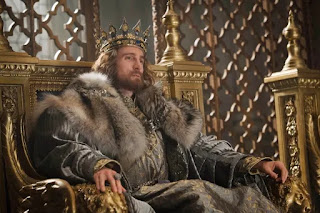The court of King Larcus Gregoras of Rath boasts several nobles: dukes, counts and barons alike. In addition, there are baronets without number, dozens of gentlemen and gentlewoman, to say nothing of the house knights, men-at-arms and free lances that are in great supply. The King also has his cabinet arrayed on his right, along with his ministers and the men who serve his lands and estate. On the left side wall are entertainments waiting to be called: a poet, several minstrels, his jesters, and the King's own bard. Arrayed before him are the courtiers, diplomats, claimants and hangers-on who all wish to be see or heard. Also in attendance are Patriach Newson of the Church of Westrun in Rath and Magister Antonius of the College of Melf.
On the docket today are matters which are dispensed with swiftly.
The second-son of the King, Larus wishes to resign from his father's house and to marry a common woman of Saklan. This is a great scandal and to grant his wish, the King has forced him to come before all assembled and make his announcement clear. When it is done, Larcus formally disowns his son but will not see him married in court, nor anywhere in the Kingdom. Instead, the King declares, Larus must find a common priest outside of the borders.
The Kings own cousins present themselves at court to make a wild claim. The King's father Laren was a twin to their father Relstan. Laren was declared the eldest child having been born 10 minutes prior to Relstan. All know that Larcus is king today because he is the oldest son of Laren. The cousins have certain proofs that, in fact, their deceased father Relstan was the eldest of the twins. They have a sworn statement of the midwife and the testimony of several nursemaids. The King promises to examine these proofs more closely and has his cousins ushered into a side room swiftly.
A noble widow wishes to disown her three sons and have them removed as heirs to her husbands house, substituting instead the strapping provincial she seeks to adopt into her husband's. Fabrisio has only a few things to commend him -- he is young and muscular and seems to have caught the lonely widow's eye. The King refuses her request citing the Fergus Codex and the right of her deceased husband to appoint his own heir.
A nobleman wishes to divorce his wife as she has born him an elf child, by all appearance. The lord produces the child as proof of her infidelity. The King dissolves the marriage and declares that for the crime of adultery the lord need not return her dowry or release her dower.
Finally, the last case is called. The barony of Sewendia is unoccupied as its lord died without producing an heir. Hakon, a commoner, claims the right to be regent based on an 800 year old agreement between the King of Rath and the people of Sewendia. Hakon has a token which he produces to prove his claim, but the token is false. A great commotion goes up among the court. The King orders Hakon to be taken and thrown into The Pit of Abu Adon.
Suddenly, a baronet steps forwarded holding a token of his own. "I am Choon Yi, sometimes called Snow, and I bear the true token and claim the right to be known as Lord of Sewendia." Another commotion is heard. All eyes are upon the Eastrun man whose bearing seems noble enough, but none gathered can be sure he speaks true. So the King's sages examine the token along with the records of the House of Sewendia. Tittering and muttering is heard throughout hte court. A brief recess is called.
When the King and his sages return, he bids Choon Yi to kneel before him and asks Patriarch Newson to place his hands upon Choon Yi's head. The ceremony is brief, but uncommonly well-attended. In full view of the assembled nobles and gentry of all of Rath, King Larcus extracts an oath of fealty and then declares the province to be his, and his children's until his line be extinguished. A cheer goes up and the matter is ratified by a rite performed by the Patriarch. Choon Yi rises to his feet as lord of Sewendia and joins the other nobility in his rightful place.
The last matter is the custom of mercy. For generations, the King of Rath has observed the coming of Spring by pardoning two accused criminals of his realm. This year the pardon is extended to Titanus the Barasin and Knu the Halfbreed Goblin -- both are outsiders and strangers awaiting trial for murder after a common bar fight. The King bids the two to come forward and state their case.
Knu claims to innocent of the accusation. He can give no account of himself and has no knowledge of his parents or lineage. Larcus regards the goblin carefully and declares him frightful of aspect but guileless.
Titanus claims to be a Ranger and as King Larcus pretended to be one as a boy, he is intrigued. The King advises that he knew all there was to learn about Rodalon and the Rangers of Old. To prove himself a Ranger, King Larcus has him repeat the Ranger Oath. The hall goes silent as Titanus repeats the words which have been spoken by every Ranger since before the Eight Kingdoms came into being.
King Larcus is impressed and grants the pardon but not before remanding the Halfbreed into custody of the Ranger -- an irony he finds entertaining. The goblin promises not to raid Rath villages, rape Rath women, steal Rath crops, or steal rath children. The Ranger promises to take the goblin as an indentured servant for a period of 7 harvests.
At that the King calls recess and retires to hear reports from his spymaster and privy council.

No comments:
Post a Comment